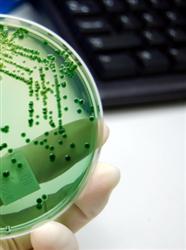Good Bacteria Make Up
The Essential Gut Microbiome
The word probiotics means, "for life", and Good Bacteria in the gut microbiome truly mean life to us. Lining our digestive system, the sum total of 400-25,000 different species of living creatures are estimated to weigh between 2 to 5 POUNDS!
Probiotic supplements were scientifically ‘discovered’ in the 1900’s in the fermented milk products of Bulgarian peasants. It was realized that these products actually contained organisms that lived in our bodies and could confer health benefits. Elie Metchnikoff won the Nobel Prize for his work, but 100 years later, we are just barely starting to acknowledge the health benefits of these good bacteria.
It is not coincidental that humans eat and thrive on the cultured foods that contain these beneficial organisms, and the prebiotic foods that feed them, such as Resistant Starch and Xylitol. It’s likely that we evolved with them until the relationship became truly symbiotic. We provide these intestinal flora with nutrients and a place to live while they provide us with multiple bodily functions that we could not live without.

Neither one can live without the other.
Most cultures (no pun intended) around the world have traditional cultured and fermented foods, like Kefir, that have been enjoyed since before recorded history. It’s reasonable to assume that just about every country that milked animals had a version of yogurt or other cultured milk products, and most populations have some form of cultured vegetable such as the Benefits of Sauerkraut provide.
It is interesting that in the US, it seems that we have become obsessed with being clean. We classify all microorganisms as being 'bad bacteria' and this has spilled over into cultured foods as well. These foods seem to have fallen out of favor in the past decades with the advent of processed and fast food. It’s no wonder that the health of our nation has been in decline. Lack of good bacteria may be a contributing factor in the drastic increase in chronic illnesses in western countries.
"[There is an]…invisible epidemic of insufficient
probiotics," said Gary Huffnagle, professor of
internal medicine and microbiology at the University of
Michigan Medical School. "We're not getting what we
used to [through diet], and we're destroying what's there.
As a result, the balance of our intestinal microbe
population has changed, sometimes with disastrous
effects on our immune system."
These bacteria and fungus confer benefits to us that we are just starting to learn about.
Among their many functions are:
• Lowering the intestinal pH
• Controlling growth of pathogens like the H Pylori Bacteria, Intestinal Candida, and C-Difficile
• Taking up space on the intestinal wall to prevent bad bacteria from adhering
• Production of essential nutrients like Vitamin B12, Omega 3 Fatty Acids, butyrate, and nitric oxide
• Regulation of the levels of IgE and IgG antibodies in immune responses
• Binding and metabolizing Environmental Toxins
• Regulation of intestinal motility
• Mucus production
Because of these many functions of probiotics, studies are showing that probiotics are beneficial in the treatment of many chronic illnesses that seem to have nothing to do with each other.
From gastrointestinal problems to
Eczema, good bacteria seem to play a major role in general
Immune System Health.
Probiotics and the Immune System
Even though these good bacteria live in the digestive system, the fact that they affect the entire body makes perfect sense when you understand all of the functions of the digestive system.
At the very least,
probiotics are safe.
There doesn't seem to be
any downside to taking them."
-Dr. John M. Morton of Stanford University
It's not there simply to digest food. The digestive system is actually the immune system powerhouse of the body. Up to 70% of the immune system is located in this long tube-like series of organs. Some of these immune system functions are a result of the complex workings of the liver, but most is because of a phenomenon called Gut Associated Lymphoid Tissue or GALT.
"There is a solid theoretical basis
for why probiotics should help
prevent... and even reverse cancer.
Probiotics produce short chain fatty acids
in the colon, which acidify the environment.
Lower colon pH is associated with
lower incidence of colon cancer.
Probiotic bacteria reduce the level
of procarcinogenic enzymes...."
-Michael S Donaldson.Director of Research,
Hallelujah Acres Foundation
The GALT is an extremely important part of the immune system. It's first and most important job is to neutralize bad bacteria, fungi and viruses that come into our bodies through food. The GALT manages to eliminate most of these bad bacteria and pathogens by coating them with a protein called secretory Immunoglobulin A or sIgA. Along with high amounts of stomach acid, this antibody effectively eliminates pathogens in the gastrointestinal tract WITHOUT alerting the rest of the immune system.
These features are extremely important. Because we ingest so many pathogens every day, our immune systems would be constantly on alert if these invaders regularly triggered a whole body response. And, in fact this may be one of the problems with autoimmune disease- which in turn is why it's important to note that the Side Effects of Omeprazole and other prescription antacids is to make the stomach less acidic. Of course, most people TAKE them to reduce acid in the stomach, but for most people, what they think is Too Much Stomach Acid is actually too LITTLE stomach acid, and they need to learn strategies to Increase Stomach Acid, not decrease it.
The GALT is also vital to a concept called oral tolerance. Oral tolerance is the method by which our immune systems learns, as infants, which foods we should digest harmlessly and which we should set up whole body immune responses to. Although these are complex processes and scientists are not exactly sure how they occur, studies show that good bacteria are essential to both of these GALT functions:
• "Intestinal colonization with commensal bacteria is critical for the establishment of oral tolerance." -Weiner 1997
• "...commensals (good bacteria) act as an important non-specific antigenic stimulus for the maturation of GALT." Cebra et al., 1998
• Probiotics increased IgA antibody responses in several different studies
Another Reason NOT to take antibiotics
Antibiotics were considered miracle drugs when they were discovered, and since that time they have saved hundreds of thousands of lives. But nothing comes without a price.
The price that we are paying as an Antibiotic Side Effect is the development of bad bacteria that are resistant to most of the current antibiotics. Pathogenic organisms like MRSA, C Difficile Infection and Tuberculosis are examples of deadly drug resistant organisms that have developed in recent years.
Another unintended consequence of using antibiotics even sparingly is that they kill off our native intestinal flora along with bad bacteria that make us sick, often giving us Antibiotic Associated Diarrhea. Even Antibacterial Mouthwash kills off good bacteria, with dangerous repercussions for long-term heart health. And when we kill off the good bacteria, it leaves room for other organisms to settle on the spaces that have been left and contribute to conditions such as C Difficile Infection and Intestinal Candida Symptoms. Like a weird game of musical chairs, microorganisms that can harm our health are free to settle in their place.
Often, there are no obvious detrimental effects to the body after taking antibiotics, but there are complex dynamics occurring in the gut that we are only starting to learn about and have definitely NOT learned to appreciate.
Entire cities living in our belly??
Most people are probably aware that there are good bacteria that live in our gut. But most don't have any idea that there are also bad bacteria, neutral bacteria, fungi and viruses that all live together. There is truly an amazingly complex and intelligent ecosystem that lives inside of us, totally without us being aware of it.
The bacteria and fungi that live in our gut actually form cooperative communities that collectively create structures for specific functions. The name for these collective structures, no matter what form they take, is 'biofilms'. And biofilms are crucial factors in our health - and in our illnesses. These complex 3-dimensional structures can take the form of pillars, mushrooms and channels and they perform specific functions such as preventing invasion by other bacterial species or routing specific nutrients to the bacteria inside.
Biofilms are not such exotic creatures either. We are intimately familiar with them every day in the forms of plaque and tartar on our teeth! Good bacteria as well as bad bacteria and fungi form biofilms. These slimy cities act in coordinated ways performing biologic warfare while competing for space and nutrients against their competitors. They also have developed complex defenses against Environmental Toxins and medications, such as antibiotics.
"Bacteria really like to grow in communities,
covered in slime,"
biofilm expert J. William Costerton
Biofilms have been implicated in the formation of antibiotic resistant organisms such as MRSA, and the C Difficile Infection mentioned earlier.
Yeast Infection in the gut
Other Antibiotic Side Effects are that they randomly kill off good bacteria along with the bad bacteria, leaving room for organisms like yeasts (that are unaffected by antibiotics) to take over their space and form their own biofilms.
The medical literature shows little evidence of the existence of Intestinal Candida in the gut, but there are a growing number of medical practitioners - western and alternative - who believe that Candida infection contributes to many chronic illnesses such as the a href="https://www.easy-immune-health.com/early-symptoms-of-fibromyalgia.html">Symptoms of Fibromyalgia. These practitioners are actively treating yeast overgrowth gut infections based on the patient's history and presenting symptoms alone.
This condition has been called Chronic Systemic Candidiasis, Chronic Unresponsive Candida Overgrowth or Intestinal Candida Symptoms by different researchers and physicians.
Too little evidence for probiotics?
Probiotics are used extensively in these treatments. In fact many good bacteria are able to form their OWN biofilms, and species such as Lactobacillis Acidophilus and Saccromyces Cerevisiae (a type of 'good' yeast) have both been shown to inhibit the biofilms of bad bacteria! Western medical doctors still claim that there is too little evidence to start recommending probiotics on a regular basis. But studies have shown that probiotics have benefits for:
• Reduction of infection rates in abdominal, pancreatic and transplant surgeries
• Prevention and treatment of eczema in children
• Decreasing and even eliminating the H Pylori Bacteria from the stomach
• Mild to moderately severe ulcerative colitis
• Infectious diarrhea and Antibiotic Side Effects
• Reducing the recurrence of urinary tract and vaginal infections in women
Even though these good bacteria have shown good results in studies on many illnesses probiotics may act in many different subtle ways that positively affect the immune system and general health in ways that we have yet to understand.
When people in almost every country in the world have used good bacteria and yeasts and knew the Benefits of Sauerkraut and other foods to improve general health since before the written word, it's a good bet that they are right. I predict that the future of medicine will go back to using simple proven remedies, like probiotics, to treat and to heal the many chronic illnesses that plague our society.
You don't have to wait until medical science 'proves' alternative medicine right or wrong on this subject.
Kefir milk, yogurt, sauerkraut, Kombucha and other fermented foods are excellent and tasty additions to your diet that you can find in most health food stores (make sure that they are NOT pasteurized as that kills the good bacteria) or you can get the book Wild Fermentation: The Flavor, Nutrition, and Craft of Live-Culture Foods
and learn to ferment foods in your own home. You'd be surprised at the variety of fermented foods and drinks that there are.
Probiotics are not a magic bullet that eliminates chronic illnesses. But in many cases, the immune system and digestive system
can be improved in subtle ways that may make a big difference in your health over the long run. Next, find out the effects that a 'Leaky Gut' can have on your digestive tract- AND your entire body....
Resources for Good Bacteria
- Wild Fermentation: The Flavor, Nutrition, and Craft of Live-Culture Foods
- Cultures for Health Store- One stop shop for all of your fermentation needs. Get yogurt cultures, kefir grains, Kombucha starters and more!
- Prescript Assist Probiotic- If you MUST take antibiotics or have taken them frequently in the past, prescript assist can help you to restore healthy bacteria in your digestive tract.
Have Something to Say about the Gut Microbiome?
Have something to say about the gut microbiome? Let us know about it.
IMPORTANT: You MUST leave your EMAIL ADDRESS if you want a response to your question. There is NO OTHER WAY for you to KNOW that I responded!!
Other Submissions about the Gut Microbiome
Click below to see what others have contributed about the microbiome.
For How Long is C-Difficile Contagious
I have Breast Cancer and my white cell counts are low after chemo they put me on antibiotics well now I have C Diff. I have a 5 month old granddaughter …
Return to Top of Good Bacteria and Probiotics Page
Go to Home Page






